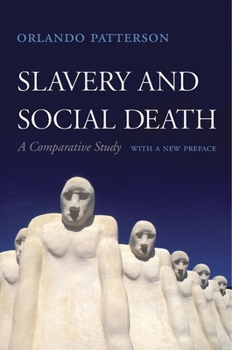Slavery and Social Death: A Comparative Study, with a New Preface
Select Format
Select Condition 
Book Overview
Winner of the Distinguished Contribution to Scholarship Award, American Sociological Association
Co-Winner of the Ralph J. Bunche Award, American Political Science Association
--Boston Globe "There can be no doubt that this rich and learned book will reinvigorate debates that have tended to become too empirical and specialized. Patterson has helped to set out the direction for the next decades of interdisciplinary scholarship."
--David Brion Davis, New York Review of Books "This is clearly a major and important work, one which will be widely discussed, cited, and used. I anticipate that it will be considered among the landmarks in the study of slavery, and will be read by historians, sociologists, and anthropologists--as well as many other scholars and students."
--Stanley Engerman
Format:Paperback
Language:English
ISBN:0674986903
ISBN13:9780674986909
Release Date:October 2018
Publisher:Harvard University Press
Length:560 Pages
Weight:1.35 lbs.
Dimensions:1.4" x 6.0" x 9.3"
Customer Reviews
3 ratings
Analyzes The Internal Dynamics Of Slavery In Sixty-Six Societies
Published by Thriftbooks.com User , 16 years ago
"In a work of prodigious scholarship and enormous breadth, which draws on the tribal, ancient, premodern, and modern worlds, Orlando Patterson ANALYZES THE INTERNAL DYNAMICS OF SLAVERY IN SIXTY-SIX SOCIETIES over time. These include Greece and Rome, medieval Europe, China, Korea, the Islamic kingdoms, Africa, the Caribbean islands, and the American South....." [from the back cover of book]
Natal alienation
Published by Thriftbooks.com User , 25 years ago
Patterson's book is groundbreaking for many reasons. That is, unlike other scholars of slavery, Patterson does not solely restrict himself to describing slaves and the institutions of slavery by juridical terms (eg Moses Finley). What is crucial to understanding the station of slaves in all societies, African: the various tribal slave systems, European: Roman,Greek,French,Dutch and English;Asian: Jewish, Islam,Indian, Korean etc is that the slave is defined by the absence of power. The slave is compelled to forgo his or her rights and concede to the domination of the owner. The slave is powerless before his or her master.This absence of power on the part of the slave was common to all slave societies, least of all the American slave society who had embraced the Aristotlean notions of slavery and discarded the Romans' who saw slavery as an outcome of fate.
A Fine compartive study of slave societies
Published by Thriftbooks.com User , 25 years ago
Patterson's book is one of the best books on slavery as an universal phenomena. There is simply no parallel to this vaunted study. That is, he reveals lucidly that slavery was an important factor among all civilizations, tribals groups among the pre Christian Europeans, Africans, and the Near and Far Easteners. Also, Patterson is one of the few to note that skin color was not the deciding factor of a slave. Wars, ransom, meagre economic circumstances all contributed to one's enslavement. Among the early African slaves in America, their hair symbolized their enslaved status. What he does not mention, though, is the fact that to understand the fullest implications of Nazi German racial laws, one must seek to understand the enslavement of the Slavs by the Germans.





